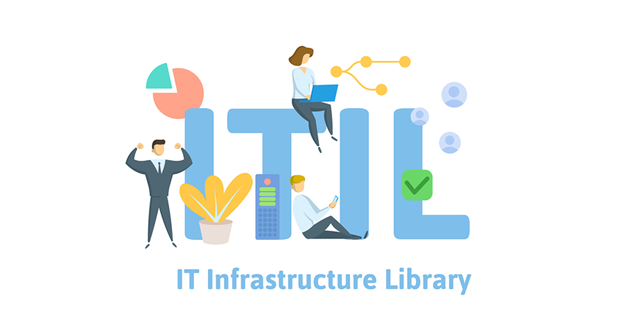Intro to ITIL
ITIL stands for “Information Technological Infrastructure Library” and its volumes are recognized as credible source for practicing IT service management over the years.It belong to all those processes, methodologies, tasks and streamlined integration assimilation which are not management specified nor any techno-specification but management applies after planning a strategy, designing a minimum delivery time and maintaining a less cost but high revenue level of competency. It let organizations develop a streamlined planned checklist to implement and measure. For external term or relations, organizations need license for ITIL certification for which ITIL foundation certification helps candidates to have a deep insight on IT service management for improvement in the industry of products and services directly related to tech.
The IT Infrastructure Library (ITIL) is a library of dimensions, measurements and strategies describing a framework of the best training for providing IT services. ITIL has passed since much academic circular revision in the past but now it is the fixed foundation of innovative five books. Each book is basically covering diversified methodologies and stages of IT service’s life span.
Importance of ITIL in 2019
Techno treatments are the traditional handshake of this era by introducing stunning and tremendous time-saving techniques. Similarly DevOps (Development and Operations) are the unique techniques to start up a sense of progress in software development environment in short in IT fields. DevOps tools and methodologies support to focus on software development. But for ITIL framework’s innovation – DevOps engineers will work with IT developers to smoothen better collaboration among development operation. Combinable both need to cooperate that may be superficial but looks natural. With increase in the understanding, many of the well-reputed organizations belong to the world of software require their employees to have ITIL DevOps Certification so that they can have the knowledge of problem management.
Intro to DevOps
DevOps began in a software development milieu and as such many of its approaches and tools focus on improving software deployment for the betterment of economy to run an organization through discipline. Continuous Integration (CI) and continuous delivery (CD) converted the arrangement process, while continuous monitoring delivers near-real-time brightness into the entire set-up. But DevOps is about more than responsive software development that is worth cool for ITIL framework to boost a very own system put into practice after its learning.
A DevOps approach to ITIL:
A DevOps Approach to the ITIL frameworkis the systematic approach to IT service management that can help businesses to cope with risks, build up customer relations, establish cost-effective methodologies, and build a stable IT environment that allows for growth, scale and change even in case of inflation or deflation (unstable situations of economy).
How can we practice ITIL in real life?
As it is better elaborated earlier, about what does ITIL meaning and concerns in detail. As already briefed that cluster of e-books not only help to improve IT DevOps or cramming these books is not a solution you have to put all your worth readings into practical efforts. But firstly, you need to wrap your brain around the clear cut concepts you learn then tools can better help you how to use them. Don’t need to hesitate that can I do this or cannot do this? Build your level of confidence either if it is going to wrong within the first few attempts. You can even take some guidance from professional ITIL personnel to practice new procedures you learn.
What a Wise man Quoted!
“ITIL is a golden box to the rest of business”.
How DevOps and ITIL Work Altogether?
There is a hidden fact that DevOps and IT Service Management (ITSM) and the IT Infrastructure Library (ITIL) are incomparable. However, this belief has very little foundation. ITIL is anagenda from which you can take or leave parts you like and, in fact, this basis provides many beneficialpatterns for DevOps operations. This is very easy to shape an actual scenario with the help of ITIL and DevOps. If we experience ITIL as a method of framework and DevOps as a beginner then a very clear collaboration will develop. So, to frame a process for practical intact it is very necessary to set up beginner stuff i.e. DevOps stuff.
Practical benefits of DevOps approach to ITIL framework
ITIL and DevOps are the best compatible to work through to make the best practice of service management to deliver within time with less but cost-effective and raised superb methods of IT techs. Time specification of an organization matters a lot to get successful treatments where ITIL frameworks with DevOps approach helps best. It also depends on the size of the company and how its departments are connected with each other. In a huge organization, it is very difficult to track everything no matter how well-managed the company is. Hence there is a need to have the process framework in place so that immediate action can be taken if a problem arises without any delay.
Apart from having the pro-active approach for management through ITIL and DevOps collaboration, the system also enable the organization to audit the whole management process. They can pick the loop holes and minimize the risks and save their organization to face the same problem again and again. It enables the management of the company to engage the suitable staff at the critical positions to get maximum efficiency out of their staff.
The organizations having large setup also face difficulties in appointing the appropriate work force at a particular department or sector. This results in affecting the performance of the whole company when overall audit is conducted after a year or five. Implementing the framework process to monitor the situation even at these smaller aspects can help companies grow in an effective way. Upgrading the technology operations to cope up with the new problems is a pro-active approach that every developed company adopts. Due to this, they improve inter department relation, communication and deliver higher values to their customers through their services.
